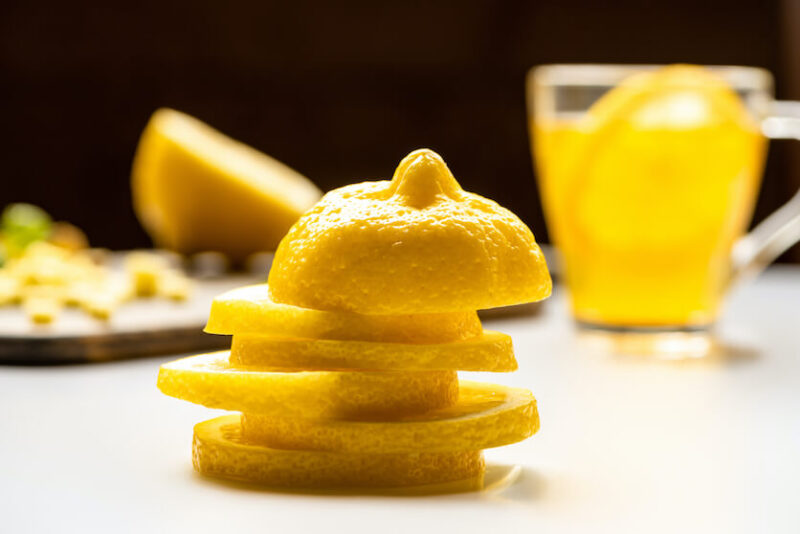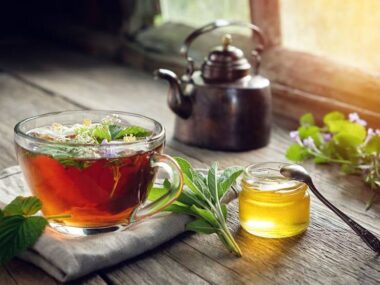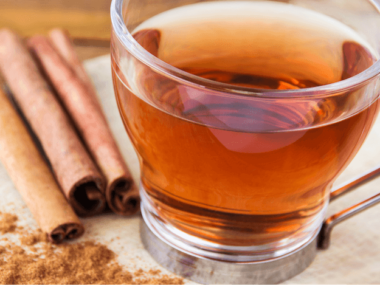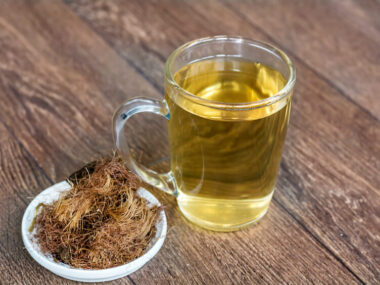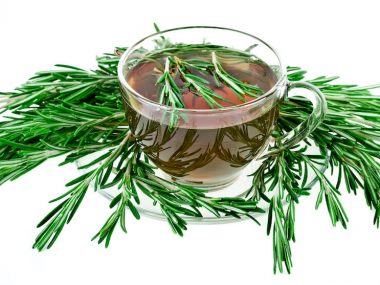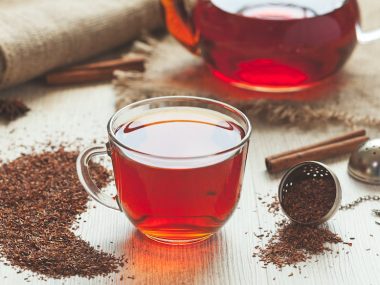A tea packed with Vitamin C has many merits, but did you know there are a few “red flags” quietly waving in its shadow? There’s a lot to learn and understand when it comes to “too much of a good thing” in lemon tea.
Table of Contents
What Is Lemon Tea?
Lemon tea is a term used to describe hot or cold tea either infused with lemon, lemon peel, or fresh lemon added after brewing. A lemon tea may have a base of black, green, or white tea, or it can be a tisane (herbal) tea.
Different Lemon Teas
Lemon tea differs in the way it’s made, the ingredients, and how it’s enjoyed. In the summertime, many tea drinkers prefer lemon iced tea. Whereas come wintertime, you’ll find more of us opting for hot lemon tea.
Russian Tea
Russian tea is primarily a black tea with lemon served hot. What makes it special, is the fashion in which this tea type is prepped and served. This tea is brought in a Samovar, which can be beautifully ornate or quite minimal.
Lemon Tisanes
Lemon-ginger, lemon-balm, and lemon-verbena teas are tisanes (herbal teas.) These teas do not contain caffeine because the ingredients are herbal and are consumed for medicinal purposes.
Wedding Tea
Wedding tea is a lemon tea with a base of black tea. It has lemon peel, elderflowers, vanilla, and almond added to create different layers of flavor. Most tea aficionados consider this to be a cream-type tea.
Lemon Cream Tea
There are several variations of lemon cream tea. One is made with a Chinese Mutan white tea base and infused lemon, rosebuds, and vanilla. Another is made with Earl Grey tea as the base with infusions of bergamot, calendula, and blue cornflowers. Yet another is made with a green tea base with infusions of vanilla, apple, and orange peel.
Honey-Lemon Tea
Honey lemon tea is our go-to hot tea for sore throats. This tea typically has a black tea base with either infused lemon or fresh lemon added. By adding honey, it not only sweetens the tea but provides a soothing coating for the throat to help relieve pain.
How Much Caffeine Is In Lemon Tea?
It’s difficult to pinpoint the exact amount of caffeine in a cup of lemon tea because lemon teas may contain black or green tea, or it may be a tisane (herbal.) Black tea has the highest levels of caffeine, so any lemon tea with a black tea blend or base could contain up to 50 mg of caffeine (six-ounce cup.)
Green tea, on the other hand, is lower in caffeine, so a lemon tea with a green tea base may have as much as 40 mg of caffeine. Tisanes made with lemon (herbal teas) do not contain caffeine. However, some herbs in tisanes can have a stimulant side effect similar to caffeine.
Is It Good To Drink Lemon Tea At Night?
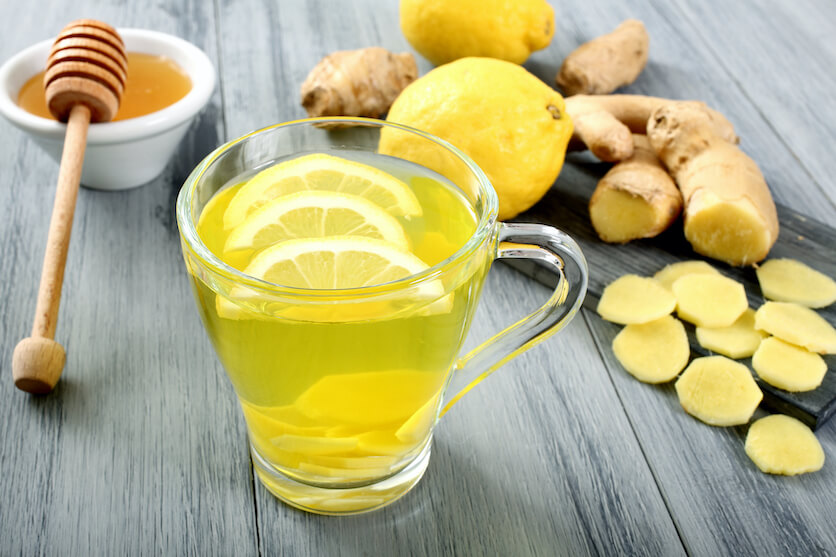
Any caffeinated tea is not ideal to consume after 3:00 pm (and even more so before bedtime). Caffeine can cause insomnia because of its stimulating effect on the body. A tea you can enjoy without a worry in the evening and before bedtime is lemon-chamomile.
For those of us who suffer from GERD (gastroesophageal reflux disease) or heartburn, the citric acid of the lemon in the tea may cause unwanted side effects when laying down after going to bed.
Can I Drink Lemon Tea Every Day?
We don’t have the professional expertise to advise whether lemon tea is safe to consume daily, but we can provide you with information to help guide you. Lemon, as you know, contains citric acid that erodes the enamel on your teeth if too much lemon is consumed.
Numerous sources claim lemon is safe to consume daily. However, a published study by the International Journal of Biomedical and Advance Research found that lemon begins to demineralize tooth enamel within minutes after exposure. Their study stated that the high acidity of lemon in raw form, juice, diluted, or used as an additive affects tooth enamel.
Furthermore, the study results reflected timed intervals of tooth mineral weight loss after consuming lemon.
Minutes After Consuming Lemon: Loss of Tooth Mineral Weight
- 1 minute: 1.0 mg
- 15 minutes: 3.0 mg
- 30 minutes: 5.2 mg
- 45 minutes: 7.0 mg
- 60 minutes: 10.1 mg
Something to also consider with the daily consumption of lemon tea is caffeine intake. The FDA recommends a maximum daily intake of 400 mg of caffeine. Lemon tea with a black or green tea base will have caffeine (as much as 50 mg per six-ounce cup.)
What Are The Benefits Of Drinking Lemon Tea?
Lemons contain a LOT of highly beneficial vitamins and minerals. The USDA nutrient breakdown of 1 raw lemon shows that although a lemon is 89% water, the remaining 11% is where all of the benefits come from.
The Nutritional Value of A Raw Lemon
- 89% water
- Carbohydrates 9.32 g
- Fiber 2.8 g
- Sugar 2.5 g
- Calcium 26 mg
- Magnesium 8 mg
- Phosphorous 16 mg
- Vitamin C 53 mg
Trace Amounts Of:
Iron, Zinc, Copper, Selenium, Thiamine, Riboflavin, Niacin, Folate, Folic Acid, Choline, Vitamin A, B12, E, D, K, Retinol, Beta/Alpha Carotene, Lycopene, and Lutein
Recommended Daily Intake Of Lemon
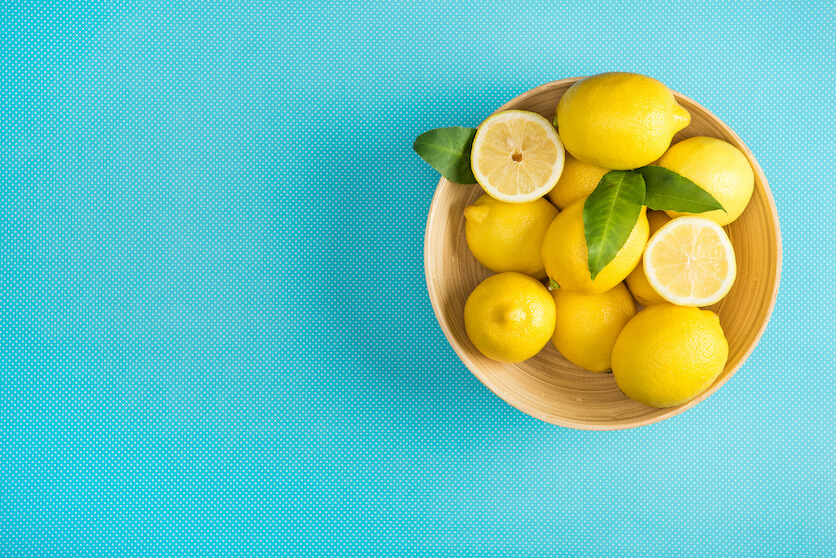
The National Institute Of Health recommends specific daily intakes of Vitamin C.
9-13 years of age
- Males: 45 mg
- Females: 45 mg
14-18 years of age
- Males: 75 mg
- Females: 65 mg (Pregnant: 80 mg, Breastfeeding: 115 mg)
19+ years of age
- Males: 90 mg
- Females: 75 mg (Pregnant: 85 mg, Breastfeeding: 120 mg)
Smokers: add an additional 35 mg
Study Indicates Vitamin C Helps Wounds To Heal
The Indian Journal of Clinical Biochemistry published a study reporting on their findings of Vitamin C’s role in helping wounds to heal. The damaged tissue in wounds (caused by injury or surgery) healing/regeneration rate of post-operative patients is dependent upon our bodies producing collagen. Patients who were given 500 mg (up to 1 g) of Vitamin C daily following surgery experienced an accelerated healing rate. It was also noted that preoperative therapy with Vitamin C was found to be highly beneficial.
Results Of Study Indicating Vitamin C Reduces Risk Of Diabetes
The Norfolk Prospective Study noted that study subjects who had a daily intake of Vitamin C over a 12-year period had a reduced risk of developing diabetes. 96.5% of patients in the study had not developed diabetes because of their intake of Vitamin C through fruits and vegetables.
Can Lemon Tea Be Bad For You?
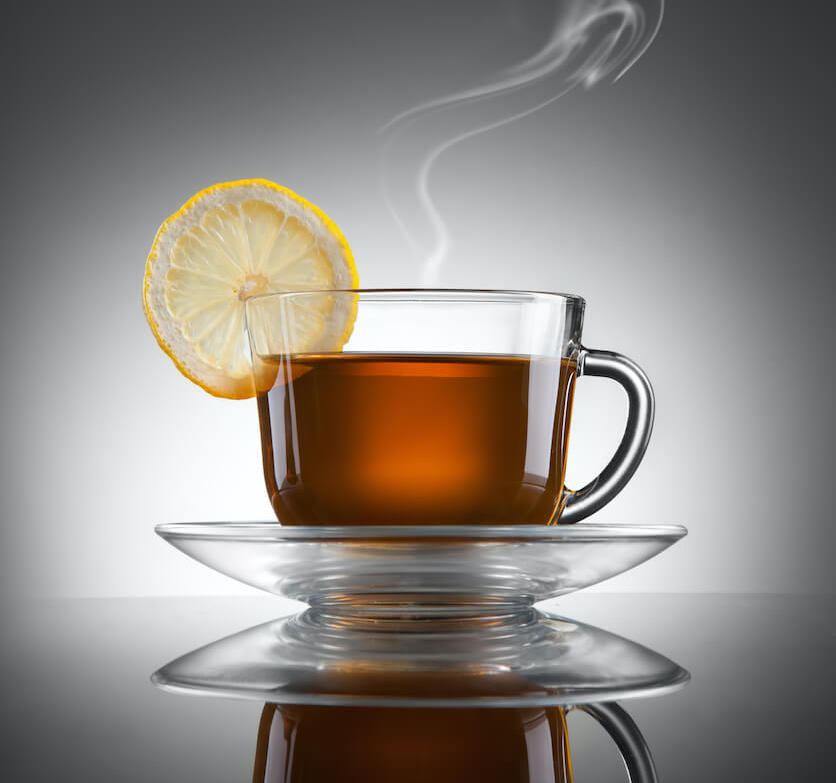
The Vitamin C found in lemons may interact with certain medications. Before consuming lemon tea or Vitamin C supplements, it’s best to consult with your healthcare provider first. Additionally, before dropping a luscious slice of lemon into your tea, think twice!
Possible Interaction With Lipid Statin
The National Health Institutes Office of Dietary Supplements also notes that taking a combination of niacin and Vitamin C in conjunction with Zocor (Simvastatin) may cause an increase in cholesterol. Before consuming Vitamin C foods/beverages (such as lemon tea) or taking a Vitamin C supplement AND niacin while taking a statin, consult with your healthcare provider first.
Raw Lemon Peel May Contain Microbes
The Journal of Environmental Health published an article on the potential danger of not properly washing and handling raw lemons. This information is a real eye-opener because many of us don’t realize that the peel of a lemon can contain pesticide chemicals (from the growers) and various bacteria from being handled during harvesting, packaging, shipping, and stocking. It’s in our best interest to thoroughly wash fresh lemons before using them.
How To Drink Lemon Tea
Lemon tea is enjoyed in so many different ways. We have a few tips and recipes for making lemon tea.
Can I Add Milk To Lemon Tea?
It’s a known fact that lemon and milk/cream do not mix. When combined, the citric acid in the lemon curdles the milk/cream. This combination in a nice cup of tea can produce a rather unpleasant effect that no one cares to consume.
Tip: A little shortcut to use when we find ourselves in need of buttermilk, but no buttermilk insight is to add lemon to milk.
How Do You Make Lemon Tea From Scratch
Just like homemade lemonade, there’s nothing better than lemon tea made with fresh lemons and a good quality tea.
Summer Lemon Twist Iced Tea
Cold, iced lemon tea is summer’s quintessential go-to thirst quencher.
Ingredients
- 6 cups of water
- 6 teaspoons of loose leaf tea (Darjeeling, Assam, or Ceylon)
- 1 fresh lemon (thoroughly washed and sliced)
- 4 teaspoons of honey (optional)
- Fresh sprigs of mint (thoroughly washed)
Directions
- Bring the water to a boil.
- Remove from the heat.
- Place loose leaf tea into a tea infuser and place it into the hot water.
- Cover and allow to steep for 5 minutes.
- Remove the tea infuser.
- Allow brewed tea to cool down to room temperature.
- Pour into a tea pitcher.
- Add fresh slices of lemon to tea.
- Pour into ice-filled glasses.
- Garnish with a sprig of mint.
Wedding Spritzer Iced Cream Tea
This chilled tea is a lovely accouterment for social gatherings or to serve with small confections at afternoon tea.
Ingredients
- 4 cups of water
- 4 cups of unflavored seltzer water
- 6 teaspoons of loose-leaf Darjeeling black tea
- 1 teaspoon of pure vanilla flavoring
- ⅛ teaspoon of pure almond flavoring
- 1 fresh lemon (thoroughly washing and sliced)
- 4 teaspoons of honey to sweeten
- Chilled tea glasses
- Ice
Directions
- Place tea glasses into the freezer to chill 1 hour before serving.
- Place the seltzer water in the refrigerator to chill.
- Bring the water to a boil.
- Remove from the heat.
- Place loose leaf tea into a tea infuser and drop it into the hot water.
- Add vanilla and almond flavorings to the hot water.
- Cover and allow to steep for 10 minutes.
- Remove the tea infuser.
- Allow brewed tea to cool down to room temperature.
- Pour the tea into a serving pitcher and add the honey. Stir well.
- Pull the chilled tea glasses out of the freezer.
- Pull the chilled seltzer water out of the refrigerator.
- Partially fill each chilled glass with ice.
- Fill each tea glass with seltzer water (over the ice) until about ¼ full.
- Pour the brewed tea into each tea glass and gently stir.
- Garnish with a slice of fresh lemon.
- Serve immediately.
Tip: Pair this tea with blueberry scones, fresh clotted cream, and marmalade.
Lemon Tea: a Delightful Variety to Try
There is no doubt that lemon tea is a Vitamin C powerhouse. Plus, there are so many great ways to enjoy it! However, moderation is a must. Don’t get too caught up in munching lemon slices or drinking lemony drinks.
